- Online car rental since 2005
- Popular countries
- Popular regions
- Popular cities
- Popular airports
- Car Rental Italy
- Car Rental Spain
- Car Rental United States
- Car Rental Portugal
- Car Rental South Africa
- Car Rental France
- Car Rental Netherlands
- Car Rental Germany
- Car Rental United Kingdom
- Car Rental Greece
- Car Rental Austria
- Car Rental Switzerland
- Car Rental Croatia
- Car Rental Belgium
- Car Rental Norway
- Car Rental Ireland
- Car Rental Denmark
- Car Rental Australia
- Car Rental Canada
- Car Rental Sweden
- Car Rental Florida
- Car Rental England
- Car Rental California
- Car Rental Sicily
- Car Rental Mallorca
- Car Rental Tenerife
- Car Rental Sardinia
- Car Rental Ibiza
- Car Rental Madeira
- Car Rental Crete
- Car Rental Gran Canaria
- Car Rental Scotland
- Car Rental Azores
- Car Rental Malta
- Car Rental Corsica
- Car Rental Lanzarote
- Car Rental Fuerteventura
- Car Rental Rhodes
- Car Rental Corfu
- Car Rental La Palma
- Car Rental Amsterdam
- Car Rental Milan
- Car Rental Miami
- Car Rental Lisbon
- Car Rental Malaga
- Car Rental Porto
- Car Rental Cape Town
- Car Rental Rome
- Car Rental Alicante
- Car Rental Bergamo
- Car Rental Barcelona
- Car Rental London
- Car Rental Faro
- Car Rental Orlando
- Car Rental Munich
- Car Rental Vienna
- Car Rental Nice
- Car Rental Johannesburg
- Car Rental Bari
- Car Rental Madrid
- Car Rental Amsterdam Schiphol Airport
- Car Rental Miami International Airport
- Car Rental Lisbon Airport
- Car Rental Malaga Airport
- Car Rental Porto Airport
- Car Rental Milan Malpensa Airport
- Car Rental Alicante Airport
- Car Rental Rome Fiumicino Airport
- Car Rental Bergamo Airport
- Car Rental Faro Airport
- Car Rental Cape Town Airport - International Terminal
- Car Rental Orlando International Airport
- Car Rental Barcelona Airport
- Car Rental Vienna Airport
- Car Rental Munich Airport
- Car Rental Mallorca Airport
- Car Rental Bari Palese Airport
- Car Rental Nice Airport
- Car Rental Bologna Airport
- Car Rental Los Angeles International Airport
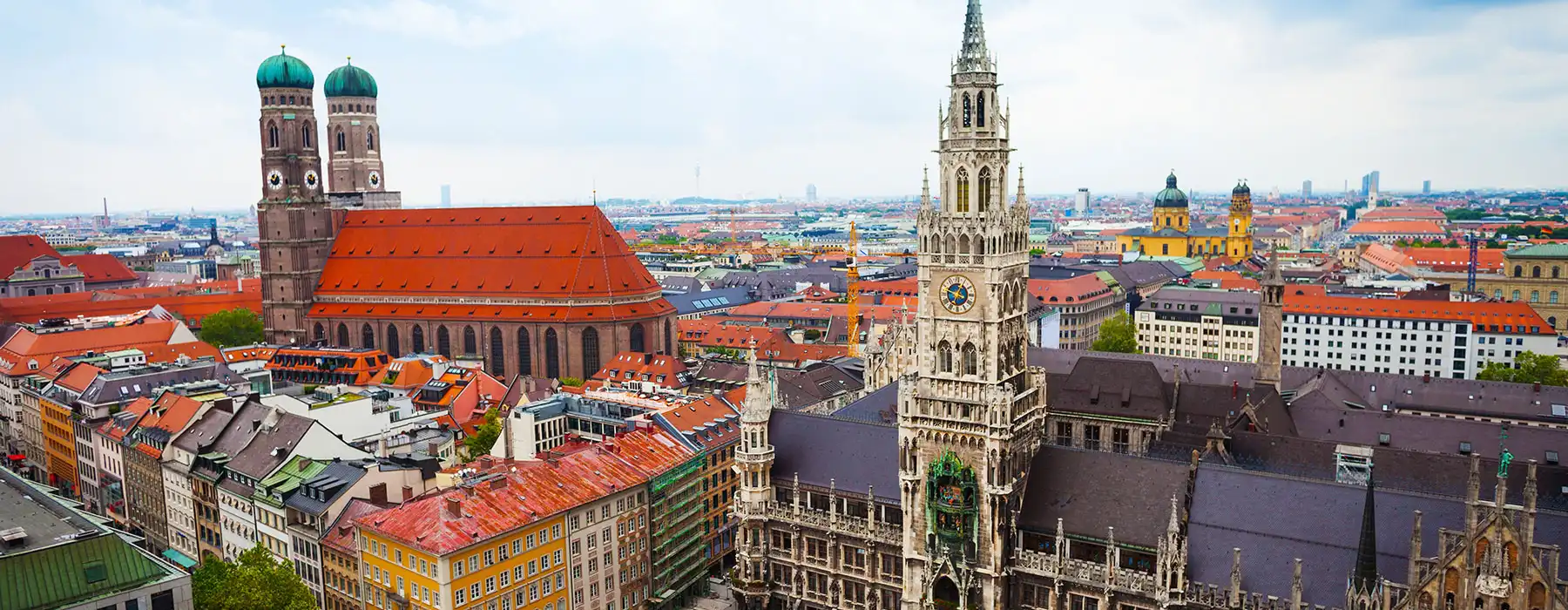
Car Rental Germany
Save time and money. We compare the offers of car rental companies in Germany on your behalf.
- Free cancellation Up to 48 hours prior to the scheduled pick-up time
- Best price guarantee Have you found a better price? Let us know and we will make you a better offer.
- 24000+ pick-up locations Locations around the world

Car Rental Germany
EasyTerra Car Rental Germany is an independent car rental comparison site. Our site compares prices from well-known car rental companies so that, as a customer, you can always reserve your car with us at a competitive rate.
Car rental offers in Germany
Whether you're looking for a small rental car or a station wagon for the entire family, we will always have a suitable vehicle at the lowest price. Below are some examples from our selection in Germany.

-
Flex To Go From€ 10 /day -
Green Motion From€ 10 /day -
wheego From€ 15 /day

-
Flex To Go From€ 10 /day

-
wheego From€ 20 /day -
Green Motion From€ 26 /day -
Flizzr From€ 35 /day

-
Flex To Go From€ 12 /day

-
Flex To Go From€ 13 /day -
STARCAR From€ 42 /day

-
Alamo From€ 26 /day -
Enterprise From€ 26 /day -
National Car Rental From€ 28 /day

-
Flex To Go From€ 14 /day

-
Flex To Go From€ 14 /day -
Green Motion From€ 15 /day -
Enterprise From€ 21 /day

-
wheego From€ 26 /day

-
Flex To Go From€ 10 /day -
wheego From€ 18 /day -
Green Motion From€ 19 /day

-
Flex To Go From€ 10 /day

-
wheego From€ 25 /day -
Green Motion From€ 28 /day -
Budget From€ 35 /day

-
Green Motion From€ 11 /day -
wheego From€ 17 /day -
Budget From€ 26 /day

-
Flex To Go From€ 12 /day

-
wheego From€ 26 /day

-
Flex To Go From€ 13 /day -
Alamo From€ 21 /day -
Enterprise From€ 21 /day

-
Flex To Go From€ 14 /day -
STARCAR From€ 44 /day

-
wheego From€ 26 /day -
Europcar From€ 34 /day -
Flizzr From€ 35 /day

-
Flex To Go From€ 11 /day -
Enterprise From€ 25 /day -
Alamo From€ 25 /day

-
Flex To Go From€ 11 /day

-
wheego From€ 21 /day

-
Green Motion From€ 11 /day -
Dollar Rent a Car From€ 21 /day -
Thrifty From€ 22 /day

-
Green Motion From€ 11 /day -
Flex To Go From€ 17 /day -
Buchbinder From€ 25 /day

-
wheego From€ 22 /day

-
Flex To Go From€ 11 /day -
Green Motion From€ 20 /day -
wheego From€ 23 /day

-
Flex To Go From€ 12 /day -
Thrifty From€ 22 /day -
Hertz From€ 23 /day

-
wheego From€ 28 /day -
Enterprise From€ 29 /day -
Alamo From€ 30 /day

-
Flex To Go From€ 13 /day

-
Flex To Go From€ 14 /day

-
Enterprise From€ 33 /day -
Alamo From€ 34 /day -
National Car Rental From€ 36 /day

-
Flex To Go From€ 16 /day -
Europcar From€ 44 /day

-
Flex To Go From€ 16 /day -
Flizzr From€ 28 /day -
Sixt From€ 28 /day

-
Enterprise From€ 34 /day -
Alamo From€ 35 /day -
Europcar From€ 38 /day

-
Flex To Go From€ 18 /day

-
Flex To Go From€ 18 /day -
Alamo From€ 26 /day -
Enterprise From€ 26 /day

-
Hertz From€ 34 /day -
Dollar Rent a Car From€ 38 /day -
Thrifty From€ 40 /day

-
Flex To Go From€ 13 /day -
Green Motion From€ 26 /day -
Buchbinder From€ 33 /day

-
Flex To Go From€ 16 /day

-
Enterprise From€ 33 /day -
Alamo From€ 34 /day -
National Car Rental From€ 36 /day

-
Flex To Go From€ 17 /day

-
Flex To Go From€ 17 /day -
Alamo From€ 26 /day -
Enterprise From€ 26 /day

-
Enterprise From€ 36 /day -
Alamo From€ 37 /day -
National Car Rental From€ 39 /day

-
Flex To Go From€ 18 /day -
Alamo From€ 30 /day -
Enterprise From€ 30 /day

-
Flex To Go From€ 19 /day

-
Enterprise From€ 36 /day -
Alamo From€ 38 /day -
National Car Rental From€ 44 /day

-
Flex To Go From€ 23 /day

-
Flex To Go From€ 23 /day

-
Hertz From€ 34 /day -
Europcar From€ 52 /day -
Buchbinder From€ 62 /day

-
Flex To Go From€ 24 /day

-
Flex To Go From€ 27 /day

-
Alamo From€ 35 /day -
Enterprise From€ 35 /day -
Sixt From€ 41 /day

-
Flex To Go From€ 29 /day

-
Alamo From€ 29 /day -
Enterprise From€ 29 /day -
Sixt From€ 51 /day

-
Thrifty From€ 39 /day -
Hertz From€ 42 /day -
Dollar Rent a Car From€ 43 /day

-
Flex To Go From€ 24 /day

-
Hertz From€ 32 /day -
Alamo From€ 244 /day -
Enterprise From€ 260 /day

-
Hertz From€ 35 /day

-
Hertz From€ 32 /day -
Alamo From€ 52 /day -
Europcar From€ 78 /day

-
Hertz From€ 32 /day -
Alamo From€ 45 /day -
National Car Rental From€ 45 /day

-
Sixt From€ 43 /day

-
Flex To Go From€ 33 /day

-
Alamo From€ 43 /day -
Enterprise From€ 43 /day -
Sixt From€ 47 /day

-
Enterprise From€ 37 /day

-
Flex To Go From€ 12 /day -
Thrifty From€ 26 /day -
Hertz From€ 27 /day

-
Flex To Go From€ 17 /day -
Europcar From€ 53 /day

-
wheego From€ 29 /day -
Enterprise From€ 31 /day -
National Car Rental From€ 34 /day

-
Flex To Go From€ 18 /day -
Alamo From€ 30 /day -
Enterprise From€ 30 /day

-
Flex To Go From€ 21 /day

-
wheego From€ 30 /day -
Sixt From€ 36 /day -
Buchbinder From€ 42 /day

-
Flex To Go From€ 23 /day -
Alamo From€ 31 /day -
Enterprise From€ 32 /day

-
Alamo From€ 25 /day -
wheego From€ 25 /day -
Enterprise From€ 26 /day

-
Enterprise From€ 34 /day -
Alamo From€ 36 /day -
National Car Rental From€ 37 /day

-
Hertz From€ 32 /day -
Alamo From€ 52 /day -
Enterprise From€ 53 /day

-
Hertz From€ 32 /day -
National Car Rental From€ 45 /day -
Alamo From€ 45 /day

-
Avis From€ 54 /day -
Keddy By Europcar From€ 72 /day -
Europcar From€ 79 /day

-
Flex To Go From€ 33 /day

-
Flex To Go From€ 38 /day -
Buchbinder From€ 86 /day -
Keddy By Europcar From€ 98 /day

-
Dollar Rent a Car From€ 56 /day -
Hertz From€ 56 /day -
Alamo From€ 57 /day

-
Flex To Go From€ 41 /day

-
Flex To Go From€ 47 /day -
wheego From€ 52 /day

-
Avis From€ 61 /day -
Europcar From€ 75 /day -
Budget From€ 112 /day

-
Alamo From€ 36 /day -
Enterprise From€ 38 /day -
Sixt From€ 40 /day

-
Alamo From€ 39 /day -
Enterprise From€ 42 /day -
National Car Rental From€ 51 /day

-
Sixt From€ 41 /day

-
Sixt From€ 49 /day

-
Sixt From€ 52 /day

-
Sixt From€ 58 /day

-
Sixt From€ 72 /day

-
Sixt From€ 59 /day

-
Sixt From€ 65 /day

-
Green Motion From€ 13 /day -
Flex To Go From€ 17 /day

-
Flex To Go From€ 16 /day

-
wheego From€ 22 /day

-
Green Motion From€ 16 /day -
Budget From€ 33 /day

-
Flex To Go From€ 17 /day

-
wheego From€ 35 /day

-
Flex To Go From€ 17 /day -
Alamo From€ 25 /day -
Enterprise From€ 25 /day

-
Flex To Go From€ 18 /day

-
Sixt From€ 35 /day

-
Thrifty From€ 23 /day -
Dollar Rent a Car From€ 24 /day -
Alamo From€ 25 /day

-
Sixt From€ 23 /day -
Flizzr From€ 25 /day

-
Hertz From€ 29 /day

-
Buchbinder From€ 23 /day -
Keddy By Europcar From€ 24 /day -
Europcar From€ 28 /day

-
Hertz From€ 24 /day

-
Alamo From€ 30 /day -
Enterprise From€ 30 /day -
National Car Rental From€ 32 /day

-
Keddy By Europcar From€ 24 /day -
Buchbinder From€ 24 /day -
Europcar From€ 28 /day

-
Hertz From€ 24 /day

-
Hertz From€ 31 /day
Popular cities in Germany
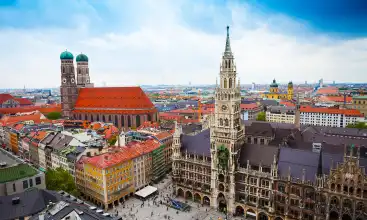
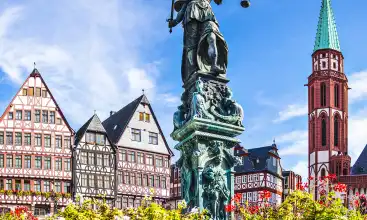
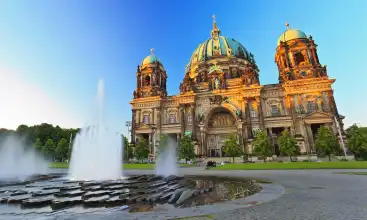
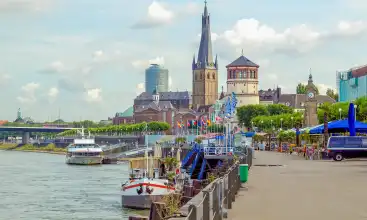
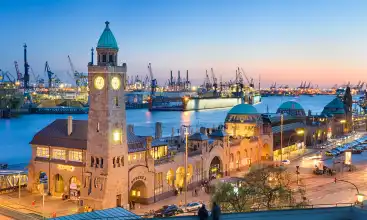
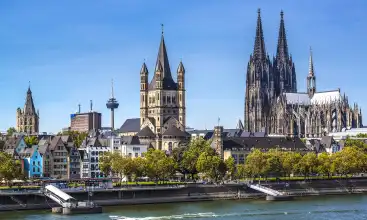
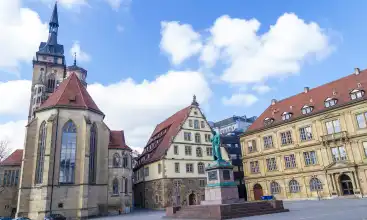
Popular rental locations in Germany
-
Car Rental Munich AirportFrom
€ 22 /day -
Car Rental Frankfurt Rhein Main AirportFrom
€ 16 /day -
Car Rental Düsseldorf AirportFrom
€ 10 /day -
Car Rental Berlin Brandenburg AirportFrom
€ 22 /day -
Car Rental Hamburg Fuhlsbüttel AirportFrom
€ 10 /day -
Car Rental Cologne Bonn AirportFrom
€ 14 /day -
Car Rental Berlin Tegel Airport
-
Car Rental Munich Train StationFrom
€ 23 /day
Useful tips for a well-prepared trip
Which insurance should I choose, and what's the deal with the deposit? Read our articles with useful information and tips to ensure you choose the right rental car for you.
Car rental locations in Germany
EasyTerra Car Rental compares rental car prices at the following destinations

Location information for Germany
Germany is best explored by rental car. EasyTerra Car Rental has over 683 pick-up locations in Germany. This means there is always a pick-up location close to your destination.
Most popular car hire locations in Germany
Introduction
Germany offers tourists lots of possibilities. The landscape is divers and invites you to beautiful long walks. You can visit small and traditional villages, old monasteries and castles, or make a trip on the river. There are plenty of opportunities to be active: motor sports are characteristic of the country, in the south there are mountains to be scaled and everywhere there are tennis courts and football clubs. In addition, Germany has vibrant cities with fun and hip bars and many shopping streets.
History
At the beginning of the Christian calendar, present-day Germany was inhabited by German tribes. The Germans managed to defeat the Romans, who occupied much of the country. After the fall of the Roman Empire, the Franks dominated Europe. Germany was incorporated into the Frankish Empire. Charlemagne, the Frankish Emperor, died and his sons were each allotted a part of the empire (in 843 AD). It was Ludwig who was awarded the east of the empire. It was not until the 15th century this area was given the name Germany.
The sixteenth century was the age of the reformation. Under Martin Luther's leadership, the Reformed Church was founded. Martin Luther opposed the papal authority and pursued various social reforms. There was a rift between the Catholics and the Protestants. The struggle eventually led to the Thirty Year War. Although it was in principle a religious war, it ended up in a European conflict between Germany, France, Sweden and Spain. In 1648, the Treaty of Westphalia was agreed. In Germany, apart from Catholicism, the Lutheran and Calvinist faiths were also officially recognized. From that point onwards, the Emperor lost authority; regional sovereigns achieved almost equal rights.
In 1789, there was a revolution in France. The monarchy was replaced by a republic. Napoleon Bonaparte took over power in France and he managed to conquer large parts of Europe. Germany was also occupied by the French. With the exception of Austria and Prussia, in 1810 all German states were part of the Confederation of the Rhine (under Napoleon's power). After Napoleon was defeated, Prussia and the other German states formed the German Federation. In 1870, the Franco-German war broke out. Germany won and founded the German Empire, under Prussian leadership.
International tensions led to the start of the First World War in 1914. In 1918, Germany was defeated by the Allies. The country was severely weakened and there was social unrest and economic crisis. The chaos throughout the country gave radical groups the opportunity to manifest themselves. In 1932, Adolf Hitler's National-Socialist German Workers Party (NSDAP) became the country's biggest political party. One year later Hitler became Chancellor, and banned all other political parties.
Hitler wanted to expand the German Empire and in 1939 this led to a World War. In 1941, Great Britain, the United States and the Soviet Union turned against Germany together. In 1945, the war was over. Germany lost and Hitler committed suicide. The Allies divided Germany into two states: in the west the Federal Republic of Germany (BRD), and in the east the German Democratic Republic (DDR). The Federal Republic became a western democracy, while the DDR became a Soviet-style communist state. The western state became more affluent than its communist counterpart and many people fled from East-Berlin to West-Berlin. To prevent this from happening the Berlin wall was put up, which separated the two states (1948).
After the Cold War, the Berlin Wall was torn down. Despite the fact that Germany was once again one state, there were major economic differences between east and west. These days, these differences are still noticeable; the former DDR is still behind in economic and social terms compared to the former BRD. In 1955, the BRD became a member of NATO. After the two states were reunited, Germany stayed a NATO member, despite the suspicions from other NATO members. Germany also joined the EU, and in 2002, it adopted the euro as its currency.
Society and Culture
Germany has a population of approximately 82.5 million. Population density is very high: Germany comes in fourth place (after Belgium, The Netherlands and the United Kingdom) in terms of population density in Europe. A very large portion of the population (almost 90%) lives in urban areas. Especially the Ruhr area is densely populated (about 11 million people). The cities of Berlin, Hamburg and Munich are popular.
In Germany live about 7.5 million foreigners. In the 1960's and 1970's, many people came to Germany to work. In addition, there are many refugees. Most of the foreigners are Turkish (30%). Also, there are Yugoslavians, Italians, Russians, Greeks, Poles, Danes and Croatians.
Germany has freedom of religion. About 38% of the population is Protestant and some 34% Roman-Catholic. Most Protestants live in the north of Germany, most Roman-Catholics in the south and west. In addition, there are some 3.3 million Muslims and there is also a Jewish minority. Most Jews live in Berlin. Many people in the former East-Germany are non-religious.
The official language is German, and it is the language that most people speak. There is a variety of dialects. Danes (who live in Schleswig) do not speak German. There are also a number of Frisians who have continued to speak their own language. German is related to a number of languages, like the Scandinavian languages, Dutch, Flemish and English.
Political Situation
In 1949, a constitution was announced that stated that Germany was a democratic-parliamentary federal state. Germany consists of 16 states that each have their own authority. Those states are: Baden-Württemberg, Bavaria, Berlin, Brandenburg, Bremen, Hamburg, Hessen, Mecklenburg-Vorpommern, Nedersachsen, North Rhine-Westphalia, Rhineland-Pfaltz, Saarland, Sachsen, Sachsen-Anhalt, Sleswick-Holstein and Thüringen.
The federal state has the final authority. The president is the head of state and is elected every five years by the federal state and the governments of the individual states. The president's power is limited and his role is largely representative in nature. The president is Horst Köhler (since 2004). He is a member of the CDU (Christian Democratic Union of Germany). The CDU is conservative, centre-rightwing party.
The federal state consists of the Bundestag and the Federal Council. The Bundestag is the German parliament and has more than 670 members. They hold the legislative power. All Germans of 18 and older are eligible to vote. The Federal Council has 69 members. They are the representatives of the governments of the individual states. The Federal Council can reject legislation that has been adopted by the Bundestag. The chancellor is the head of government. He is appointed by the president and has the authority to lay down political guidelines. Since 2005, Angela Merkel is Germany's chancellor. She is the country's first female chancellor.
The judiciary power is in the hands of the German court: the Bundesverfassungsgericht. One half of its members are elected by the Bundestag, the other half by the Federal Council. The Bundesverfassungsgericht guards the constitution.
Economy
Despite the chaos after the Second World War, Germany managed to become the world's third-largest economy in 2004. However, in recent years there has been no economic growth. Due to the fact that the average age of the population is increasing, the number of active participants in the economy is falling. Also, Germany is faced with high unemployment. The costs of social security are rising. East-Germany is still lagging behind West-Germany. Every years a great deal of money is spent on developing the economy in the east of the country. However, things seem to be going in the right direction for Germany.
The service sector has the largest share in the country's GDP. Agriculture no longer represents a major share. Most agricultural companies are one-man businesses. Production is destined especially for the domestic market. The automobile industry is Germany's largest exporter. In Europe, Germany is the main producer of luxury cars. In addition, the country exports many machines and parts, chemicals, metals, food products and textile. The heavy industries are located in the Ruhr area.
The western EU-countries are important trade partners of Germany. The country exports many products to France, The Netherlands, Italy, Belgium and Luxembourg. Outside the European Union, United States and Japan are also important for trade. Trade with countries in Central and Eastern Europe has increased in recent years. Germany imports a lot of food products, petroleum and natural gas.
The tourist sector has also grown. These days, Germany is a popular holiday destination. The tourists are mainly from The Netherlands, the United States and Great Britain. Bavaria is a real tourist attraction. It is an area that is ideal for winter sports. Furthermore, Berlin attracts many tourists, as do the Sauerland, Thüringen and the Black Forest.
Germany's currency used to be the Deutschmark. Since 2002, the country's currency is the euro. It has a fixed value of 1.96 Deutschmark per euro.
Geography and Climate
Germany is located in Central Europe and it covers an area of about 357.000 square miles. Due to its central location, the country borders on different countries: in the North it borders on Denmark, in the east on Poland and the Czech Republic, in the south on Switzerland and Austria and in the west on the Benelux and France. Its total borders are 3618 km. In addition, the country borders on the North Sea and on the East Sea.
Germany is a relatively big country, which means that its landscape is also diverse. In the North, there are mostly plains consisting of fertile clay and sand grounds. The North and South are separated by the central mountain range. In this area, rivers have left deep valleys. The slopes are used for viniculture. The South of Germany consists of high mountains that gradually change into the Alps. The Zugspitze in the Bavarian Alps is Germany's highest mountain (2962 meters).
The largest lake is the Bodensee in the South of the country. This lake has a surface of 570 square kilometers. There are several large rivers. The Rhine, the Elbe and the Weser flow to the North Sea. The Danube flows to the Black Sea.
Germany has a moderate maritime climate. This means the winters are cool and the summers mild. Throughout the years there is a lot of precipitation. The coldest month of the year is January, when temperatures can reach minus six degrees Centigrade. With temperatures of around 17-20 degrees Centigrade, July is the warmest month. In spring and summer, due to the warm winds temperatures can sometimes rise tremendously (within a few hours!). In the lowlands in the North precipitation is lowest. As the mountains get higher, precipitation increases. In these areas the summers are warmer and the winters colder.
Traffic and Infrastructure
The quality of Germany's infrastructure is very high. Especially in the west, railways and highways are good. Almost 78% of all transport of goods takes place on the roads. The German Autobahns are famous around the world; on many stretches there is no speed limit, although there is an advisory speed of 130 km/h.
Germany's railway network is extensive and well-organized. In 1994, the western and eastern transport corporations were privatized and merged into the Deutsche Bahn AG. In addition to carrying passengers, trains also transport part of the nation's products. On various trajectories between major cities there are high-speed trains, connecting cities such as Frankfurt, Hanover, Wuerzburg, Mannheim, Stuttgart, Munich and Berlin. Especially for business people, high-speed trains offer an ideal way of travelling quickly from one city to another.
Part of the transportation of goods takes place by water (20%). Examples of products that are transported in this manner are earth, stone and coal. Canals have been built that connect the various rivers. Especially the river Rhine is a busy transport route. Important inland ports are Duisburg, Cologne, Hamburg and Mannheim. International trade products are also transported by water. From large seaports (like Hamburg, Wilhelmshaven, Bremen / Bremerhaven, Lübeck and Rostock) ships leave for countries like Great Britain, Denmark, Norway, Sweden and The Netherlands.
Air traffic to and from Germany has increased tremendously in recent years. There are sixteen international airports. Especially the airport of Frankfurt am Main (Frankfurt Flughafen) is important to Germany; after London-Heathrow it is Europe's second largest airport. The airports of Munich and Dusseldorf are also big. Also, there are airports in Hamburg, Cologne / Bonn Berlin and Stuttgart. Germany's largest airline is Deutsche Lufthansa AG.
Time zone
Germany has a time zone of GMT +1. In the summer (from April to October) the clock is put an hour forward. This means that during the summer darkness falls an hour later.
Food and Drink
The German kitchen is diverse. Meals are sturdy and can be a bit harder to digest. There is a lot of meat: bratwursts, roast pork, roast beef, etc. Also, most dishes include potatoes or soup. A traditional German salad is the Kartoffelsalat: a potato salad with cucumber, mayonnaise and onion. A famous German delicacy is the Berliner Bol (made from fried yeast dough).
Germans are real beer drinkers. There are various brands that are available all over Germany (for instance Warsteiner and Bittburger). Cafés often serve local beers. North Rhine-Westphalia is the area were they drink the most beer. Furthermore, the German population drinks a lot of coffee and water.
In addition to traditional restaurants, there are plenty of restaurants that offer foreign cuisine (like Turkish, Italian, Greek or Chinese). Restaurants around Germany often open around 6 pm. The Germans themselves don't have dinner before 8 pm. Generally speaking, German restaurants are not very expensive. It is customary to leave a small tip.
Accommodation
Germany is well adapted to the many tourists visiting the country every year. There is a variety of ways to spend the night in Germany. There are hotels, B&B's, apartments and pensions. There are also many youth hostels (especially in the major cities) for those who are on an economy budget. Also, there are holiday parks where it is possible to rent a cabin or campsite. Often, these campsites are very suitable for families with children.
External Sources
For more information about German, we recommend Google as well as the following sources:
- Wikipedia, Germany
- Destination Germany (multilingual)
- Deutschland-Portal (multilingual)
Practical information
-
CurrencyEuro
-
Driving directionRight
-
City speed limit50 km/h
-
Freeway speed limit100 km/h
-
LanguageGerman
-
Popular car categoryCompact
What most people want to know
The following questions and answers are a selection of the most popular questions. If you do not find the answer to your question, have a look at the Frequently Asked Questions page or contact us.
- Enterprise
- Avis
- Thrifty
- Hertz
- Sixt
- Flizzr
- National Car Rental
- Keddy By Europcar
- GLOBAL Rent-a-Car
- Green Motion
- OK Mobility
- Europcar
- Alamo
- wheego
- Global Rent a Car
- InterRent
- Buchbinder
- Dollar Rent a Car
- Budget
- Flex To Go
- OK Rent a car
- Red Spot Car Rental
- Edel & Stark
- Your Rent
- Elite (Luxury)
- McRent
- Drive Hellas
- AVIS Car-Away
- CITROEN
- Caradvance GmbH
- Apollo Car Rental
- Advantage Rent a Car
- City Car Rent a Car
- STARCAR
- United rent a car



